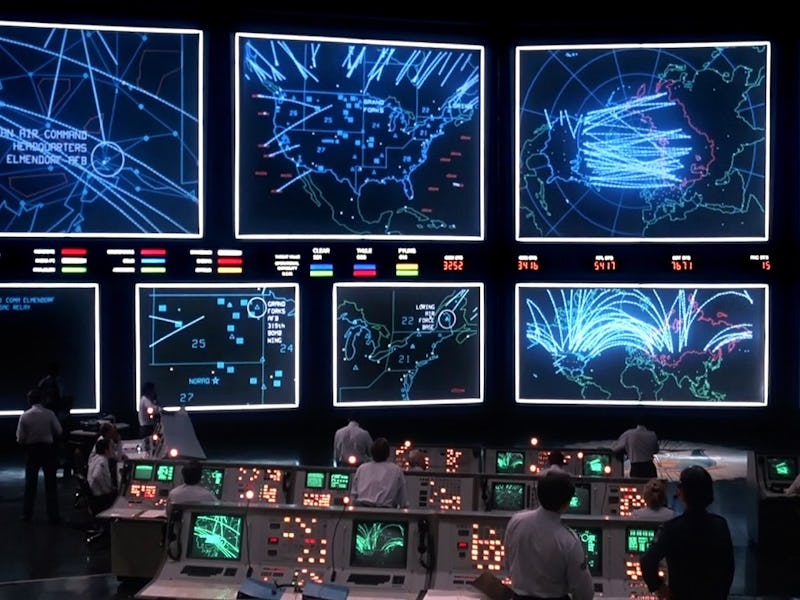In the ‘80s, Too Many Movies Tried to Fuse Sci-Fi With Rom-Com. This One Worked.
Here's why Matthew Broderick’s AI thriller is still so great, 40 years later.

One of the greatest things about ‘80s science fiction movies was the odd insistence on blending bleeding-edge sci-fi with teenage high-school comedy. And although 1985’s Back to the Future is infinitely more famous with this cocktail, someone else did it first on June 3, 1983 — and perhaps more subversively.
If you don’t buy the idea of a teenage kid accidentally hacking into the firing codes for nuclear weapons, that’s okay, because Matthew Broderick’s relationship with Ally Sheedy makes even less sense. WarGames is a funhouse mirror reflection of a classic sci-fi thriller that often feels like a dark comedy. And four decades after its release, the movie remains timeless not because of what it was about then, but what it symbolizes now.
Describing the premise of WarGames in 2023 makes it sound... bad. A charming high school hacker-slacker named David Lightman (Broderick) accidentally awakens a proto-AI running various nuclear war simulations. His sidekick is schoolmate Jennifer Mack (Sheedy) who hangs out with him for no other reason than the film is just written that way. The supercomputer then mistakes one war game for real life, putting the world at various declining DEFCON levels. Eventually, David figures out that the creator of this supercomputer — previously presumed dead — is still alive. In the end, with the help of the reclusive genius, Jennifer and David save the day and convince the WOPR computer not to nuke the entire world.
In its broadest strokes, WarGames might sound corny and only interesting through the novelty of ‘80s nostalgia. For those who were introduced to Gen-X's love for the movie through Ernest Cline’s 2011 novel Ready Player One, it’s possible you’ve had the specialness and singular joy of WarGames ruined for you. Because this was an ‘80s movie, starring two prominent members of the “Brat Pack,” WarGames is rarely discussed seriously as a great science fiction film, partly because of its ‘80s-ness. But, WarGames is more than just an outdated sci-fi flick full of quaint and unrealistic references. And it’s more than just a half-baked YA romance in which our lovebirds have little to nothing in common and no real reason to fall in love. Yes, WarGames contains these elements, but these are superficial charms that obscure the smarter movie lurking beneath the surface.
If you strip away the ‘80s baggage of WarGames — which is admittedly, very hard — at its core lies a clever indictment of why human laziness, combined with emerging automated technology, can literally lead to the end of the world. Historically, WarGames is famous because its depiction of hacking as a real threat may have directly influenced President Reagan’s policy about computer security. This might make you think the film is only about the Cold War (a James Bond-ish premise, fused with something that might pass for a John Hughes movie). These unique reasons made WarGames ahead of its time 40 years ago. But now, those aspects feel like the wrong reasons to praise it.
Today, what makes WarGames wonderful isn’t the Cold War commentary or even its focus on an accidental nuclear war. Instead, the pervasive nature of AI replacing humans for a boring logistical reason is, essentially, why anything happens in the movie at all. The U.S. government decides to remove the human element from missile silos, because, hey, the the computer is going to call the shots if nuclear war happens anyway. The mega-dark opening scene drives this idea home: One missile silo worker refuses to turn his launch key unless he can get verbal confirmation on the phone from a real person that he really should launch the nukes. It’s pretty hard to get a real person on the phone today, isn’t it?
As chatbots and rudimentary AI continue to dominate various aspects of daily life, the idea of a nuclear missile key-turner losing his job to an algorithm is brilliant. Not because his job is important in terms of stakes but because it’s so believable. Equally believable is Jennifer and David’s flippancy about using hacker skills to mess around with cybercrime and alter the nature of the truth. What do they care? They’re just having fun, right?
Do you want to play a game?
As proto-hacker movies go, WarGames did what Tron couldn’t a year prior: use video games as a metaphor. Tron focused on imagining that sentient programs are just like people. WarGames does the opposite. The WOPR/Joshua computer doesn’t really behave like a human. It behaves like a severely limited algorithm. This problem, of course, is at the core of real-life fears about over-grown algorithms misunderstanding all sorts of ethical considerations — from intellectual copyright to basic confidentiality, and beyond.
In WarGames, the computer doesn’t understand the difference between a game and real life. This is the basic truth of all so-called “intelligent” software. The difference between life itself and data that simulates life is simply something algorithms will never comprehend in the way humans do.
WarGames posits David as the hero because he convinces WOPR that the rules of the game are flawed. David might be motivated by human compassion, but crucially, the way he wins is by thinking like an algorithm, not the other way around. This is WarGames’ mic drop moment, a twist that feels more subtle and chilling now than it did forty years ago. WOPR isn’t scary like Skynet or ruthless like HAL. What makes WarGames so good is that the killer AI here isn’t exceptional. Like the tech we take for granted today, the AI threat in WarGames is boring and ordinary. And that is scary.